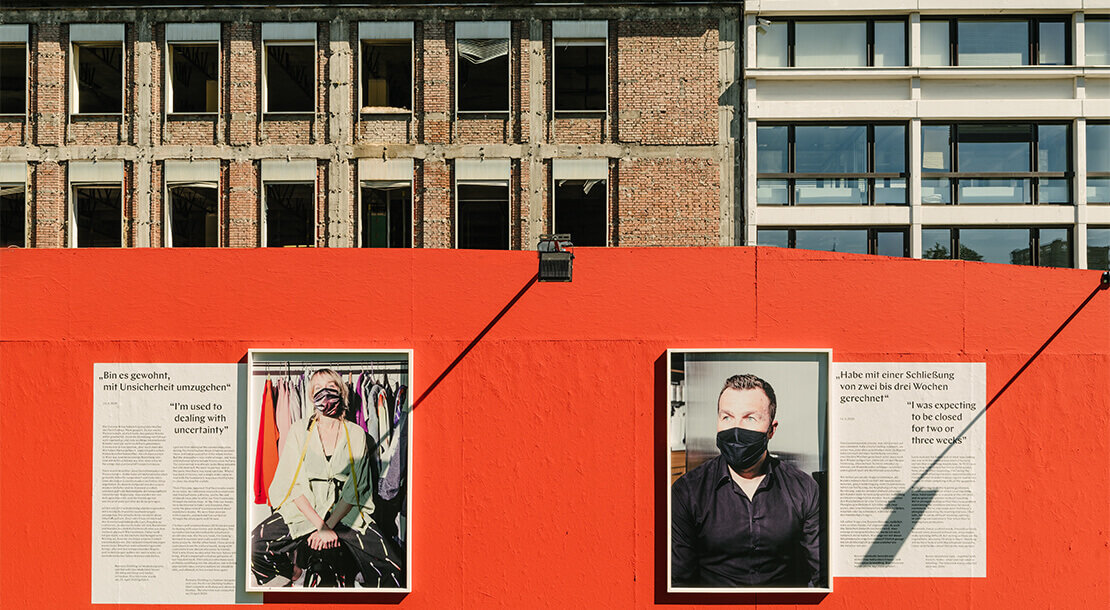
The exhibition on the opening day (September 7), Photo: Klaus Pichler
Hauptinhalt
Reactions to an Exhibition
Face it!
We were expecting direct reactions to the exhibition mounted on the building site fence, a kind of engagement that is always a part of outdoor exhibitions. After all, the topic of masks (and other anti-Covid-19 measures) was already hotly contested during the spring. Beyond that, an opposition to the measures had emerged both virtually and in reality with the aim of gaining public attention for its views. Reactions to the exhibition reflect this radicalization of the debate. During the first weeks isolated critical comments were written on parts of the exhibition, which the museum deliberately chose not to remove. Occasionally, the museum had to replace defaced photos. But in October, the exhibition was completely destroyed on repeated occasions, especially on weekends when demonstrations against Covid measures took place in the city center.
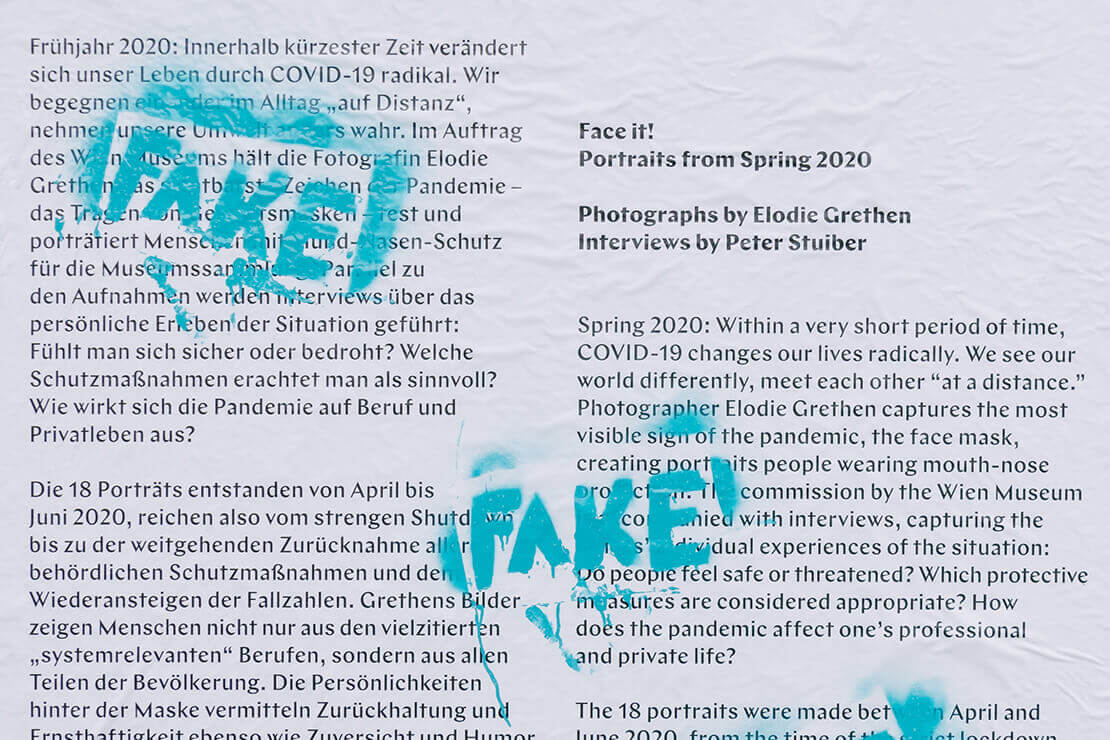
How should a museum deal with these kinds of “expression of opinions”? Originally, the exhibition lining the building site fence was planned to run until the beginning of January 2021. But out of consideration for the people who made themselves available for this documentary series, the Wien Museum will display the photographs and statements exclusively online from this point forward. This “virtual exhibition" ensures that the public will continue to have access to the content while also making sure that the people portrayed no longer become the target of anonymous personal attacks at the building site fence.
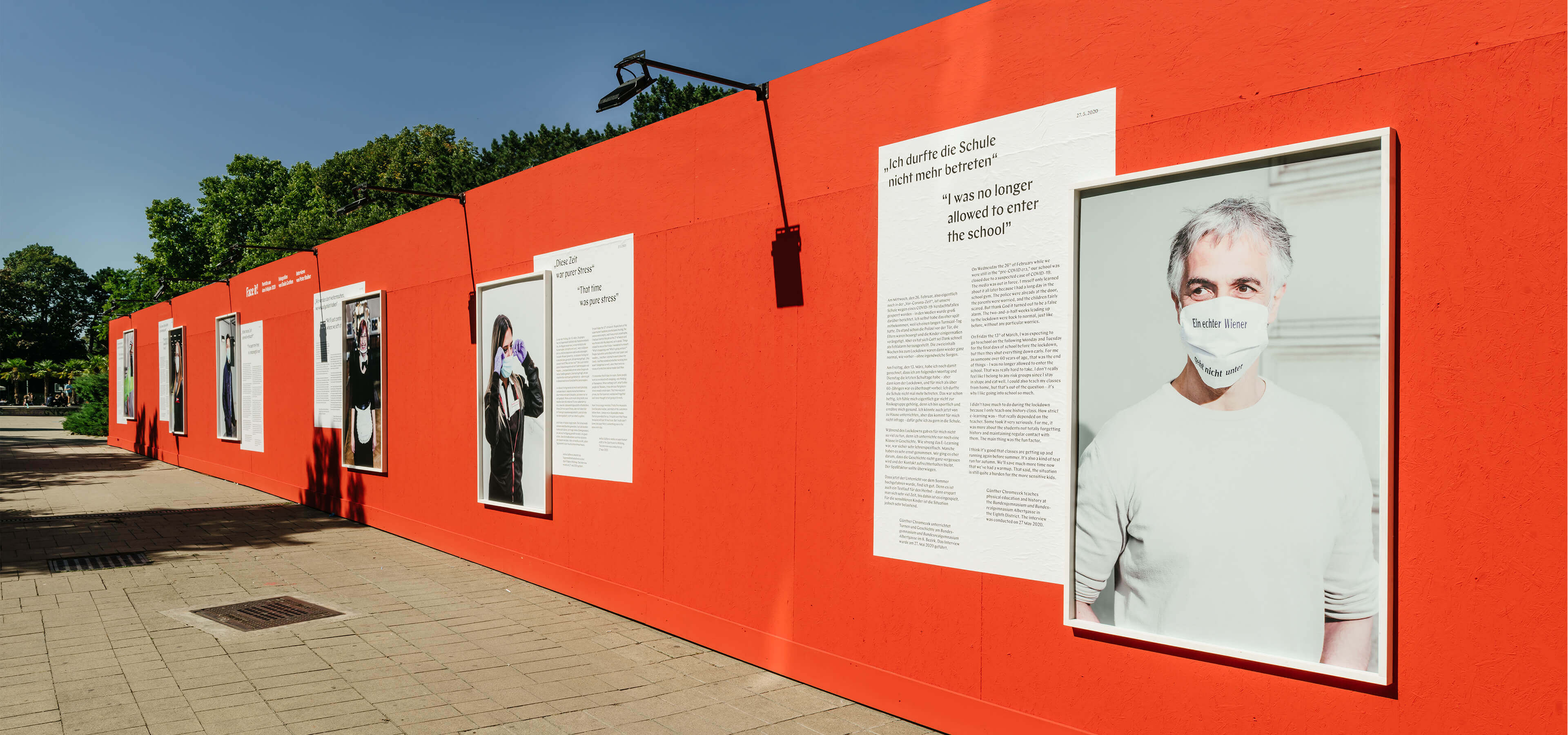
“We had to keep our contracts”
On the first Monday of the shutdown, everything was still very much up in the air. As I arrived at the building site I initially thought to myself that this would be it for work. The other workers also weren’t so sure what was happening. But since the government hadn’t explicitly forbidden construction work, I quickly realized that everything needed to carry on. After all, we had to keep our contracts with our clients.
We immediately set to work organizing masks, safety glasses, and disinfectants for everyone and put social distancing rules into place. Unsurprisingly, some workers preferred to stay home. We respected that, of course. Corona has already changed the nature of my workday. At first deliveries of building materials were quite difficult. We also had to reschedule work, redistribute personnel to different parts of the building site, stagger breaktimes, etc. But all of that wasn’t really a big deal, since the precautions are a necessary means to an end. I always wear a mask on the worksite when I’m in contact with other workers. Otherwise I don’t wear one.
Even though I was unsure of things at first, I don’t really feel threatened by the disease itself. We eat healthily at home, we eat lots of fruit, and my wife also ordered vitamins. I play sports and am still relatively young. I’ve gotten used to the situation and am not worried – and not worried about my job, either. Things will always be built.
Christian Plank works as a foreman for Ay-Ka Bau.
The interview was conducted on 17 April 2020.
“It’s better not to go out”
I wear a mask and protective gloves when I go shopping, on the tram, and in places where there are lots of people. I’m not a hundred percent sure whether I’m safe wearing a mask or not. But I feel better and I believe that I won’t be as easily infected, and that I won’t infect others. I’m worried about my children, so we stay home and only go out when we need something urgently. If everyone cooperates and stays home, then the illness can’t spread. There are eight of us in the apartment and there’s not a lot of space. But it’s better not to go out. I also think that things will go on for many months because there’s still no medications and no vaccine against the illness.
Shahnaz Kashfi is single mother and lives with her children in Favoriten. The photo is of Shahnaz and her children Saleha and Ali. The interview was conducted on 15 April 2020.
“And then I got sick”
I’ve been dealing with the coronavirus ever since it became an issue in China. As the first cases in Italy were emerging, I began writing information for the Arab community in Austria, with which I’m deeply connected because of my heritage.
At the beginning of March I began with protective measures at my practice. And then I got sick. I came down with a dry cough on Monday the 16th of March, closed my practice, and only had contact with patients over the phone. By Wednesday it was clear that it could be the coronavirus because I had developed a high fever and sudden exhaustion. On Thursday and Friday the symptoms were almost gone, but on Friday evening I had difficulty breathing. I called the ambulance on Saturday afternoon because I had no way of administering myself oxygen. I was in the Kaiser Franz Josef Hospital for six days. I was never afraid I’d die, but I didn’t know how long my difficulty in breathing would last. There’d be a new symptom every day: one day muscle aches, then loss of taste and smell.
I’ve been able to work here at my practice again since April 9th. Perhaps it’s easier for me because I’ve already been infected. The antibodies I have should protect me for at least a few months. I have quick tests for my kids, we have all that we need, and my assistant at my practice feels safe too. I’m glad that I can keep working for the neunerhaus as well, because the medical care of the homeless is extremely important right now.
The coronavirus will be with us for a long time. I get the impression that people aren’t taking things as seriously anymore. That’s why it’ll be important to keep the number of infections low for as long as possible – until we have treatments or a vaccine.
Rula Al-Harbi is a general practitioner, runs a practice on Landstrasse, works for the neunerhaus (an NGO that cares for the homeless), and also works as an occupational physician for Health Consult (Red Cross). The interview was conducted on 27 April 2020.
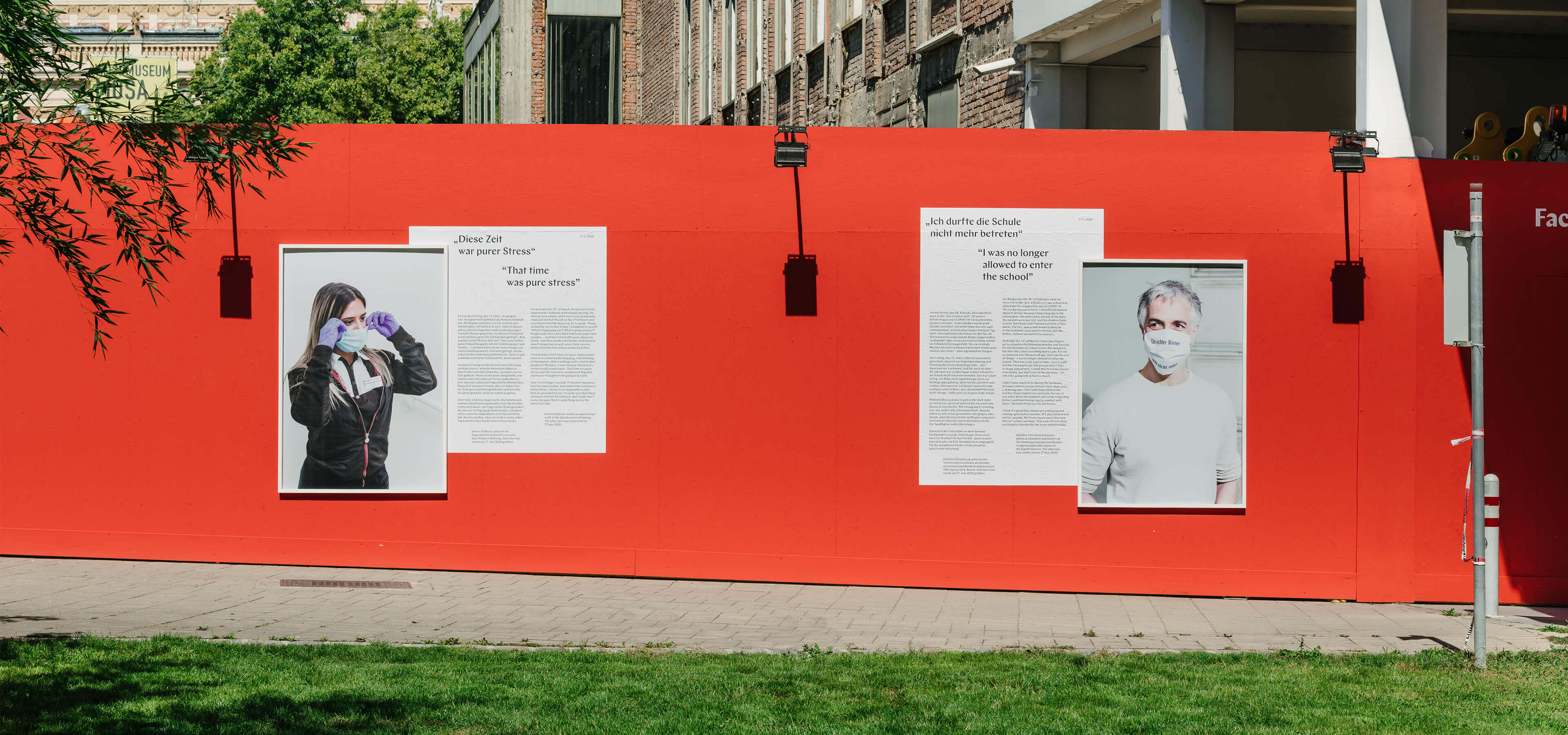
“I’m used to dealing with uncertainty”
I got my first inkling of the coronavirus crisis during the Paris Fashion Week. I had my premier there and had prepared for it the whole winter. But the atmosphere was really strange, and many international retailers hadn’t even come to Paris. The coronavirus was already something palpable but still abstract. We went to parties, and at the same time there was hand sanitizer. When I was back in Vienna, not a single order came in. And with the lockdown it was clear that I’d have to close my shop for a while.
Then it became apparent that face masks would be an issue. So I did some research on materials and tried out some patterns, and by the end of March I was able to offer our first facemasks through my online shop. At the time our masks were mentioned in Falter and Standard, then came the government’s announcement about mandatory masks. We were then overrun with requests, and demand has carried us through the crisis quite well till now.
I’ve been self-employed since 2013 and am used to dealing with uncertainty and challenges. The current crisis has intensified the situation in an extreme way. On the one hand, I’m looking forward to summer and really want to finish some projects. On the other hand, I have several customers from the cultural world, along with customers from abroad who come to Vienna. That’s why I have no idea what the near future will bring. What’s important is that we get some of our freedom back. The radical restrictions were probably justified given the situation, but with the appropriate rules and precautions we should be able, and allowed, to live normal lives again.
Romana Zöchling is a fashion designer and runs the Ferrari Zöchling fashion label complete with shop and atelier in Neubau. The interview was conducted on 23 April 2020.
“I was expecting to be closed for two or three weeks”
I only realized the full extent of what was coming our way with the coronavirus when it became certain that everything would close. At first I was expecting to be closed for two or three weeks. Now, shortly after reopening, I’m facing the challenge of offering everyone appointments in a timely manner in order to keep regular customers happy, all while complying with all the guidelines.
We’re adhering to all the hygiene guidelines. Customers have to wear a face covering in the shop, hand sanitizer is available at the entrance, and we greet one another without touching. We’ve arranged seating so that there’s no problem maintaining the minimum distance between customers. We’ve also made sure that there’s plexiglass separating the washing stations. I feel safe, but it can be difficult washing, cutting, or coloring our customers’ hair when they’re wearing face protection.
Personally, I wear a cotton mask. It would certainly be much more pleasant without one, since masks make speaking difficult. But as long as those are the regulations, of course I’ll stick to them. How long will we have to deal with this situation? Honestly, I have as little idea about this as the next person.
Kenan Islambašić runs – together with his wife Anita – a hair and nail salon in Meidling. The interview was conducted on 5 May 2020.
“The 6 o’clock applause was extremely motivating”
The lockdown was a very stressful time. Everything changed from one day to the next – how we handled the food, and how we dealt with restaurants and customers. It was easy before: head to the restaurant, pack up the food, ride to the customer’s place, deliver the food, done. Now we have to pay attention to keeping our distance, we have to be vigilant about how we handle everything, etc., so that there’s no possibility of infection. Now, it’s not only a matter of paying attention to the traffic, but even more so to the regulations about the coronavirus.
I’m in a position where I communicate between management and the other drivers, so I’ve been able to hear their respective points of view – the concerns of the drivers, and those of management, who need a precise knowledge of the rules and have to enforce them. During the initial period of uncertainty, emotions occasionally ran high when something didn’t work out right away.
With the news that the restaurants were closing, our business was effectively down and out. Things only got going again in the second week, with many new restaurants that needed to be trained about deliveries. For them it was the only way to generate sales, and the customers were grateful that they didn’t have to go out. People had bunkered down, and the tip was stuck to the door or placed on the doormat. The 6 o’clock applause was extremely motivating. One time I experienced it in the courtyard of a new building on the Schmelz. It felt as if I had just taken the stage.
Dominik Lackner works as a bicycle food delivery driver and spends some of his time in the office as a “rider captain” as well. The interview was conducted on 22 May 2020.
“The many deaths should be a warning for us”
It was my twenty-year-old niece who made me aware of the coronavirus. Her mother-in-law is a doctor and had cautioned against taking the illness too lightly. When Italy got hit hard, I started to get worried, not least because my mother died of a serious lung disease.
Soon we started noticing things at work, but everything came about gradually in connection with the shutdown: more information, hand disinfecting, keeping a safe distance, no meetings, etc. It wasn’t easy, but it worked because the garage managers implemented all the measures quickly. Then came the barriers between drivers and passengers in the buses, and since then it’s actually been a safe job.
You can tell that people on the bus are careful. In the beginning, many thanked us for keeping the buses running. Now some come up to the front to complain when, for example, other passengers forget to wear facemasks. At any rate, I open all the doors at each bus stop to air out the bus, which can’t hurt.
We had the option of staying at home, but I didn’t want to stop working because there are so many people out there who rely on bus service. And besides, I could just as easily have gotten infected while shopping or out for a walk. In general I feel safe, but I totally respect the threat. I also think that the many coronavirus deaths worldwide should be a warning for us not to get used to it.
Daniela Holzer works as a bus driver for the Wiener Linien.
The interview was conducted on 12 May 2020.
“I’ve spent my time in a meaningful way”
I’m a competitive orienteering athlete. Three or four days before the lockdown, I had an indoor training session with my club at the Schmelz sports facilities. We joked about the coronavirus, even wisecracked about conspiracy theories. It was only when everything shut down that I realized what it meant for the time being: canceled training sessions, no competitions, and, unfortunately, no world junior championship, which was supposed to have taken place in Turkey this summer.
The next thing that was canceled was my entrance exam for my physical therapy studies, which ended up partially taking place online. I sat around the house quite a bit, but also went jogging almost every day, looking for routes where I wouldn’t run into too many people.
When the call went out for those who had already completed their civilian service to report for duty, I didn’t think twice. I didn’t know exactly what would come my way, but it’s been good for me working here in the COVID-19 care center at the exhibition grounds. I’m working at the registration and intake center, where we take phone calls and shortwave radio messages, and organize admissions and discharges in coordination with the hospitals and the doctors here. We were empty for the first two weeks, then people started coming one after the other.
I myself don’t feel threatened, because I don’t deal directly with the patients. My period of extra-ordinary civilian service ends in June. I’ve learned a lot here and have been able to help out. I’ve spent my time here in a meaningful way, which has been important to me.
Marius Poirson is a student and worked for the Samariterbund Wien. The interview was conducted on 25 May 2020.
“We’ll just continue where we left off”
It took me two weeks to really realize what was going on with the lockdown and accept it. I just couldn’t imagine an entire country being shut down. But I thought to myself, “They’ll know what they’re doing.” The government had specialists, doctors, virologists, etc. as advisors. It would all get taken care of properly.
The fact that you could only have phone contact with people was already quite something. And the empty streets were uncanny, like in a horror movie. But I wasn’t scared at all. I was just worried that the café wouldn’t be able to open until autumn.
Now it’s mainly regular guests from the neighbor-hood who show up. With proper distancing and hand disinfection I don’t see any problem at all. The guests are happy to be served their coffee and breakfast again, and the atmosphere is good. The older guests are still a bit reluctant to stop by. Normally we have a lot of tourists, but we’ll see if they show up this summer. You have to make the best of it. We’ll just continue where we left off. We’re very optimistic that things will again be like they were before the coronavirus.
Snezana Pajkic works as a server at Café Goldegg.
The interview was conducted on 26 May 2020.
“That time was pure stress”
It was Friday the 13th of March. People here at the supermarket suddenly started panic buying, the shelves were empty, and it was a real catastrophe. I had just started this job on the 2nd of March and was thrown into the deep end, so to speak. Things clicked for me on that Friday. I wondered to myself: “What’s happening now? What’s going on here?” People had entire carts filled with toilet paper and noodles … And then I started to worry about my family. And then wondered whether working here wasn’t dangerous as well, since there were no means of protection and no masks back then.
I’ll remember that Friday for years. Some people went so overboard with shopping, only thinking of themselves. When nothing’s left, what’ll other people do? Besides, it was obvious that grocery stores would remain open. That time was pure stress, but the team here worked well together and I never thought of not going in to work.
Now I’m no longer worried. Protective measures have become routine, and most of the customers follow them. I always wear disposable masks that are provided for us. I’m quite sure that these measures will last till next year. But I really don’t know, because there’s something new in the news every day.
Melisa Salihovic works as supermarket staff at the Spar branch in Währing. The interview was conducted on 27 May 2020.
“I was no longer allowed to enter the school”
On Wednesday the 26th of February while we were still in the “pre-COVID era,” our school was closed due to a suspected case of COVID-19. The media was out in force. I myself only learned about it all later because I had a long day in the school gym. The police were already at the door, the parents were worried, and the children fairly scared. But thank God it turned out to be a false alarm. The two-and-a-half weeks leading up to the lockdown were back to normal, just like before, without any particular worries.
On Friday the 13th of March, I was expecting to go to school on the following Monday and Tuesday for the final days of school before the lockdown, but then they shut everything down early. For me as someone over 60 years of age, that was the end of things – I was no longer allowed to enter the school. That was really hard to take. I don’t really feel like I belong to any risk groups since I stay in shape and eat well. I could also teach my classes from home, but that’s out of the question – it’s why I like going into school so much.
I didn’t have much to do during the lockdown because I only teach one history class. How strict e-learning was – that really depended on the teacher. Some took it very seriously. For me, it was more about the students not totally forgetting history and maintaining regular contact with them. The main thing was the fun factor.
I think it’s good that classes are getting up and running again before summer. It’s also a kind of test run for autumn. We’ll save much more time now that we’ve had a warmup. That said, the situation is still quite a burden for the more sensitive kids.
Günther Chromecek teaches physical education and history at the Bundesgymnasium und Bundesrealgymnasium Albertgasse in the Eighth District. The interview was conducted on 27 May 2020.
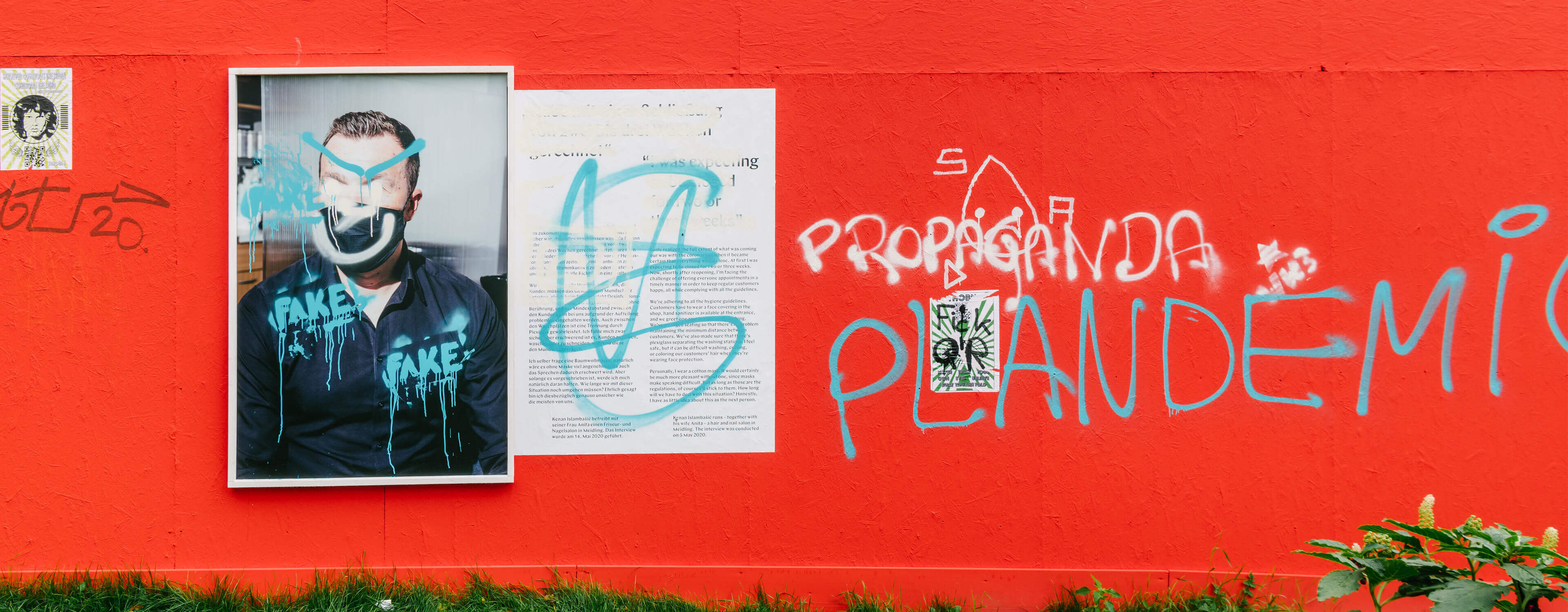
“Most people followed the rules”
On the first before the lockdown I was on embassy security detail in the Third District. You could already see that the Thursday amount of goods people were buying got larger by the hour. I wanted to go shopping that evening myself, but let it go in the end because there were so many people.
When there was talk of measures and regulations during those early press conferences, I realized that my duties as a policeman would also change. But things remained manageable in the end because most people followed the rules. Everything was quite calm and easy to keep under control. People understood what it was all about. For example, we asked a group of older people who were standing close together to break up their gathering and keep their distance from one another. They simply hadn’t been paying attention to how close together they were and they didn’t argue with us. Judging from my experiences, hardly anyone would have opposed the regulations in force, and people were ready to sacrifice their own needs.
As for myself, I’ve never felt in danger. In my line of work, I always deal with groups of people who could have contagious diseases, so I’m more cautious by nature. Wearing a mask was something that took some getting used to, but thank God the mask requirement wasn’t in force at the height of summer. Now that wearing masks is no longer required, I don’t think many people will wear them. And I’m also glad that I don’t have to enforce those kinds of regulations anymore – because the population’s acceptance of masks has decreased noticeably, and they’d probably just talk back to us.
Dominik P. works as a policeman in Vienna.
The interview was conducted on 3 June 2020.
“My Clients didn’t panic either”
I haven’t been swept up by the crisis, not even at work – because, with the exception of one case, I didn’t have to care for anyone suspected of COVID-19. In that one case, it was a man from a homeless shelter who had to quarantine because he had spent time with someone ill with COVID-19. It was an interesting experience having to wear a full-body protective suit while caring for someone and helping him eat or shower.
At the beginning of the crisis I didn’t take the virus all that seriously. I thought it would be like it is with the flu: over in a few weeks. I never felt myself to be in danger, but I was still really careful so that I wouldn’t infect my clients. For me it was completely clear that I’d keep on working. And my clients didn’t panic either. I wore a mask, but other than that, everything was the same: washing hands, using disinfectants, and wearing rubber gloves. That’s all standard anyway when it comes to nursing care. Despite the easing of restrictions, we should all be careful. We don’t know what else is in store.
It was quite depressing for a few clients not being able to go out. But most are already older and have lived through much more serious crises, such as the war. In this sense I think that young people have almost been more deeply affected. Maybe we can take something away from this – that you should cherish what you have. You don’t have to go to H&M every day to be happy.
Ines Schwarz works in home care services for the Samariterbund Wien. The interview was conducted on 3 June 2020.
“Now I’m free again”
Freedom is the most important thing for people. That’s why this coronavirus period has been very difficult for me. I was quarantined for two weeks with 240 people. It was in a clinic in the 13th district, you couldn’t lock your room, there wasn’t even a closet for belongings. I had everything stolen there: cash, bank card, my ÖBB card, etc. I was also scared because I had already had heart surgery. But thank God I am strong and had enough medicine. I am very glad that I have internet on my mobile phone. That way I could watch movies, otherwise I would have gone crazy in my room.
Now I’m free again and have my peace and quiet. Tomorrow I can finally go home for the first time in three months and see my three children who live in Hungary. They work at Lake Balaton and hope that tourists will come soon. I’ll recover for about ten days at home and then I’ll come back to Austria.
I have been selling the Augustin newspaper at the same place for twelve years, so I have many regular customers. They also bought the paper during the lockdown when there were fewer people on the street, so it was no problem. I am not afraid of the coronavirus. When I’m back in Vienna, I’ll stay at a workers’ hostel in the 17th district, which costs 52 euros a week. I feel safer there. I’ve saved some money and I can use it for that now.
Ernö Horvath works as an Augustin news-paper salesman in Vienna. The interview was conducted on 9 June 2020.
“I talked to my parents twice a day by video”
I had planned two trips for March and May to visit my parents in Italy. I started to worry when the number of cases at home increased sharply, even though my home region of Naples was not as deeply affected as Lombardy or Veneto. I talked to my parents twice a day by video, sometimes between two emergency calls with suspected COVID cases. It was quite emotionally draining for me. My parents didn’t leave the house for eleven weeks. Those were tough times.
It was already clear at the beginning of March that we had to prepare ourselves at work. Then came the protective measures. Every emergency call has a specific code, and since COVID there’s an additional text for suspected cases. For safety reasons, we always ask the patient directly whether they have any COVID symptoms. If so, we’ll follow a different procedure: briefly leave the patient’s apartment and put on a full protective suit. In suspected cases, the patient is taken directly to a COVID ward in the hospital, where a special isolation chamber has been set up. It took about two weeks for us to integrate the new procedures.
I get a bit worried on COVID calls – not because of me, but because I don’t want to pass the disease on to my family, for example, or to my mother-in-law. I think the easing of restrictions is good. I also think that all the strict measures still in force in the medical field are appropriate, especially since the danger’s great that a spark could ignite a wildfire again.
Elio C. is an emergency paramedic with the Vienna Red Cross. The interview was conducted on 17 June 2020.
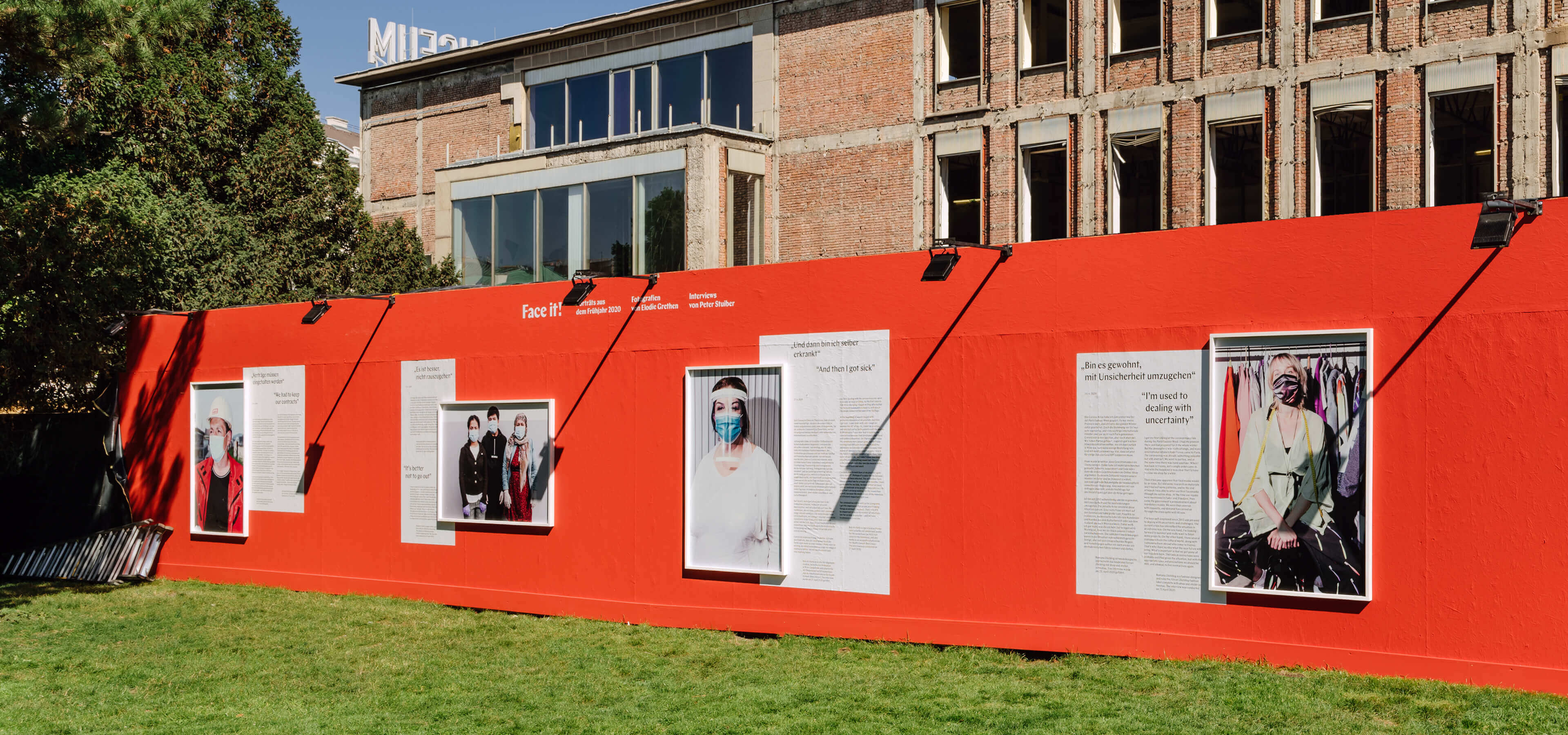
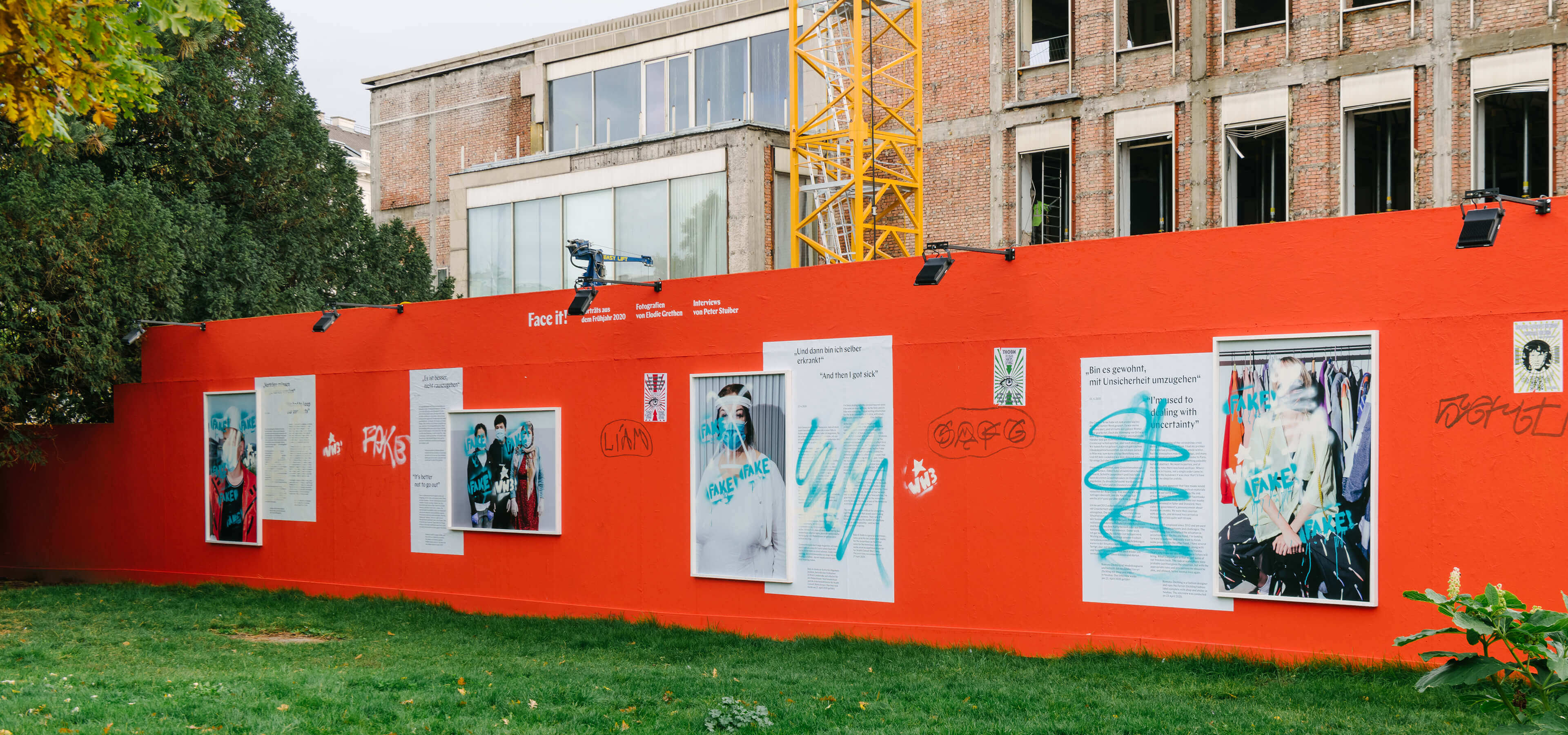
“Most of our Customers bought pain relief medication”
About ten days before the lockdown, the Medical Congress took place in Ischgl, which was in the headlines due to infections. At the same time, I attended a continuing education event for the Chamber of Pharmacists in Schladming, where, thank God, there still hadn’t been any cases. Yet I wondered why it was even taking place at all. Ultimately the event was called off just after it got underway.
We weren’t really able to prepare ourselves for the lockdown at the pharmacy because we had plenty to do. We had about three times as many customers as usual on Friday, March 13th. Most of them bought pain relief medication. In particular, we advised them to take immune-boosting medication. Masks and disinfectants were already sold out by then. The masks that Health Minister Maria Rauch-Kallat had purchased for emergencies, and which were being stored in Vienna’s pharmacies, could not be distributed because the general situation had not been classified as an emergency.
My colleagues and I never felt overly endangered, at least since the plexiglass protection shields were installed. Infectious diseases are a constant issue in pharmacies, so we always adhere to the necessary hygiene measures. It hasn’t been any different with Corona.
I’m very skeptical about the current easing of restrictions, just like I am about all this extreme back-and-forth. When numerous people stand in line at the supermarket, it makes sense to wear a mask. Anything different actually shows a lack of consideration, especially for at-risk groups.
Kristina Taubald is a pharmacist and has managed the Alte Löwen Apotheke since 2008. The interview was conducted on 16 June 2020.
“The Cultural Sector was underestimated”
The first few days staying indoors and working from home were strangely okay. I work part time in an EU-project with a lot of partners in different countries, where a lot of meetings are virtual anyway.
I’m also, outside of my office job, curating, DJ’ing, and doing cultural/community work a lot with and for the black community. The situation now really changes the way how we can show art, put on events or even interact with an audience. There were festivals in summer where I was booked for that were canceled. So there’s a lot of less income from my freelance work. I think there is not enough support for individuals in the cultural sector, this is a bit of a concern. The cultural sector was for sure underestimated: how much people need cultural stimulation, how much they rely on this for psychological, creative and recreational reasons.
I was active in the recent Black Lives Matter-demonstrations in Vienna. A friend of mine was taking photos of the first demonstration and posted it – then someone made a comment like “What about Corona?” Why did 50.000 people gather on the first day of the protest? I responded to the person: “We don’t have a choice!”
I was specifically talking about those groups that are disproportionately affected by racism and disciminated against as well as suffering under the current pandemic, who – for example – don’t have equal access to the a decent health system, or don’t have the option to work from home or have someone look after their kids whilst they work. Having to demonstrate during a pandemic represents a double or triple threat, so to speak. But it is a risk that some are still having to take.
Tonica Hunter works part time in the Digital Department of the Austrian National Library as well as freelancing as a curator and cultural producer. The interview was conducted on 24 June 2020.
“I was a voluntary shut-in”
The lockdown initially meant that we had to close our shop. That’s when I realized how serious things were – and I stayed home for two months. The one exception was when I’d drive my wife to our book-shop in the morning and pick her up in the evening. You could say that I was a voluntary shut-in. But that didn’t disturb me in the least because I’m not a very talkative person anyway. Since I have a preexisting condition, I was more worried than someone who’s healthy. But thank goodness it’s gone well till now.
Since the bookshop’s been open again and I’m also spending more time here, I’m careful to keep my distance – more than a meter. Today I go about my business without much worry, but I follow my own rules, which are stricter than the ones laid down by the government. I avoid places like supermarkets and give people a wide berth when they come to-ward me while looking down at their smartphones.
It’s gone relatively well with the customers in the shop, but people are quite forgetful and keep coming closer and closer when they’re talking to you. They somehow seem to think that things are back to normal. Then you have to remind them that the virus is still in the air.
In the beginning I sat in front of the TV the whole time finding out information about the virus. In the meantime I’ve stopped doing that: I know what the disease is, what it does, and how to protect myself from it. Everything beyond that doesn’t interest me.
Klaus Jeller is a pensioner and helps out his wife Anna at their bookshop. The interview was conducted on 30 June 2020.
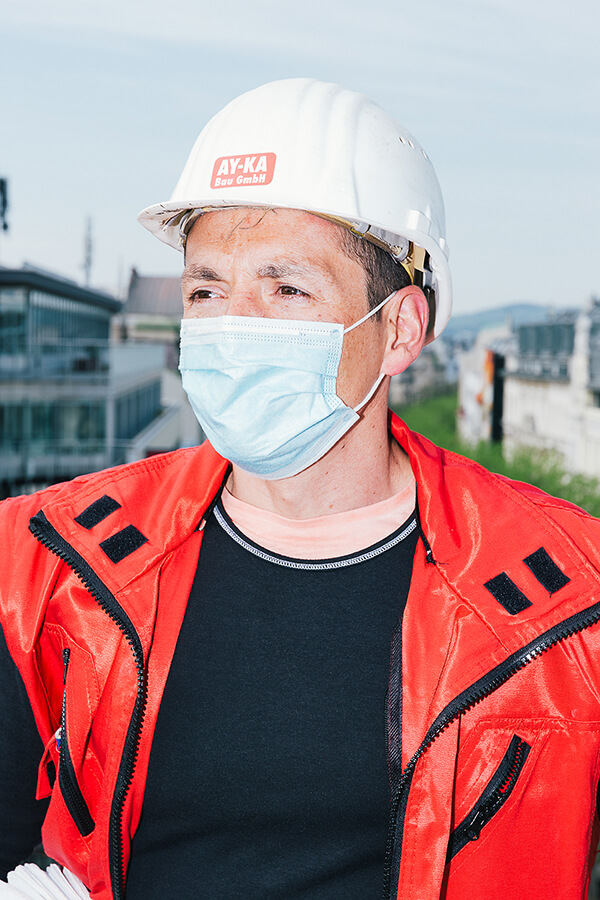
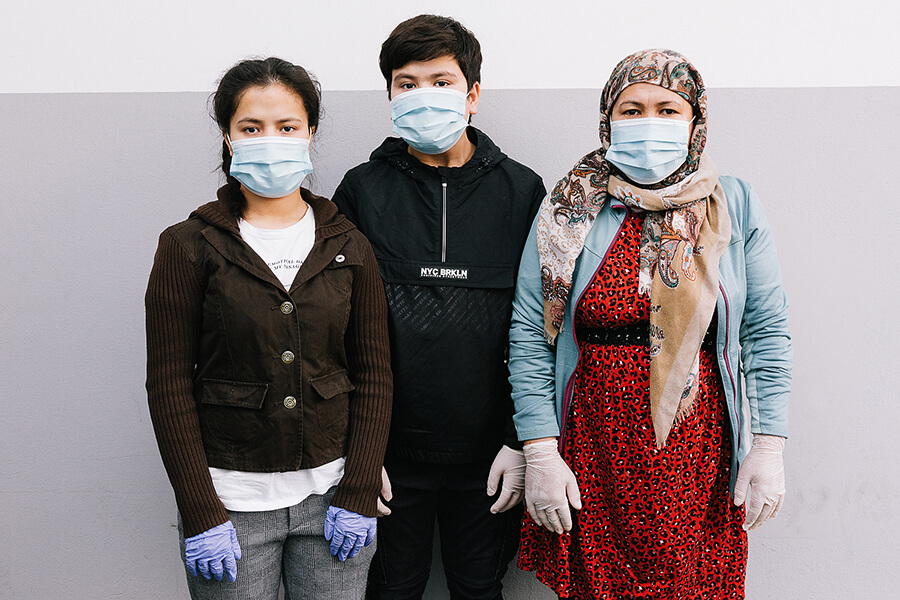
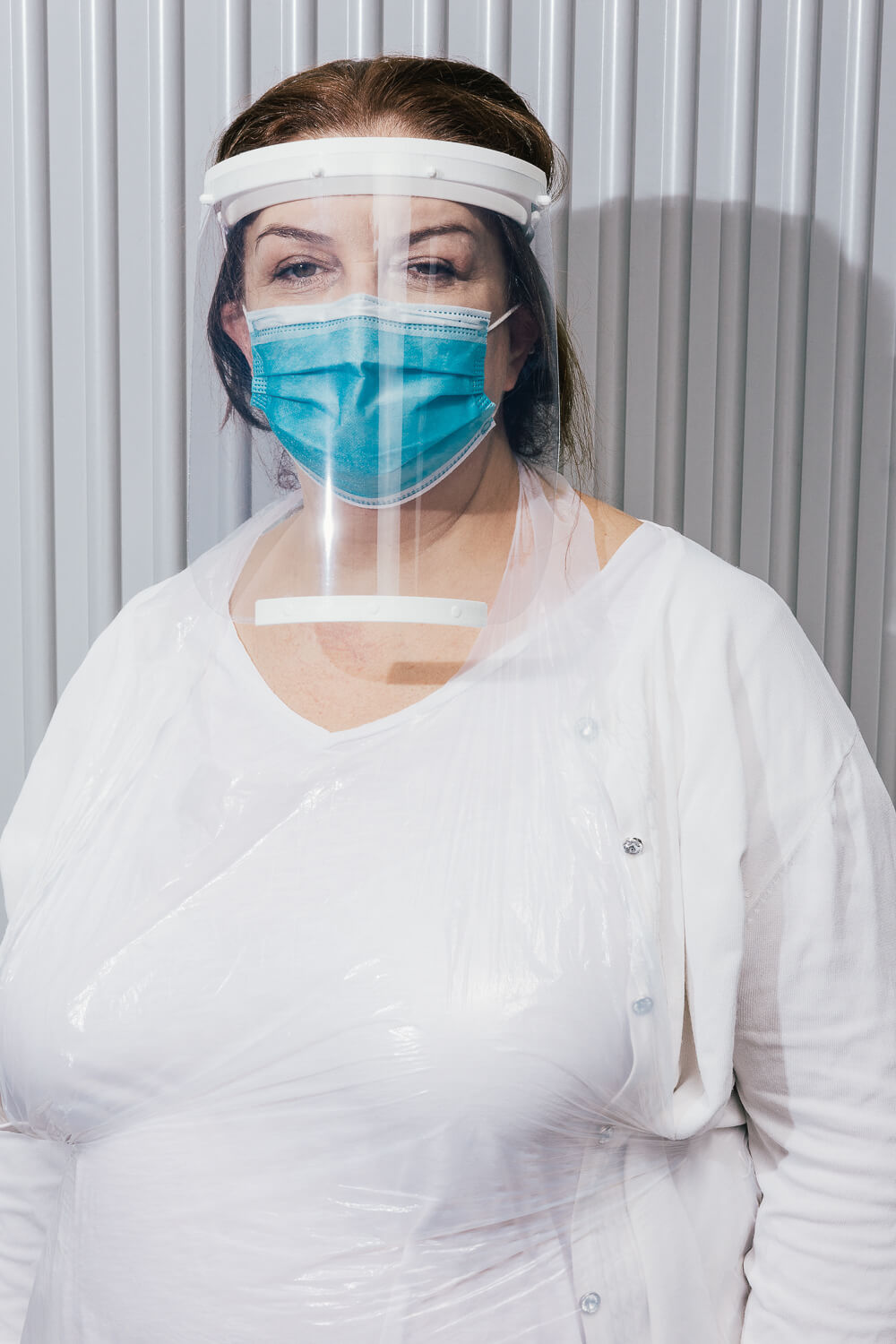
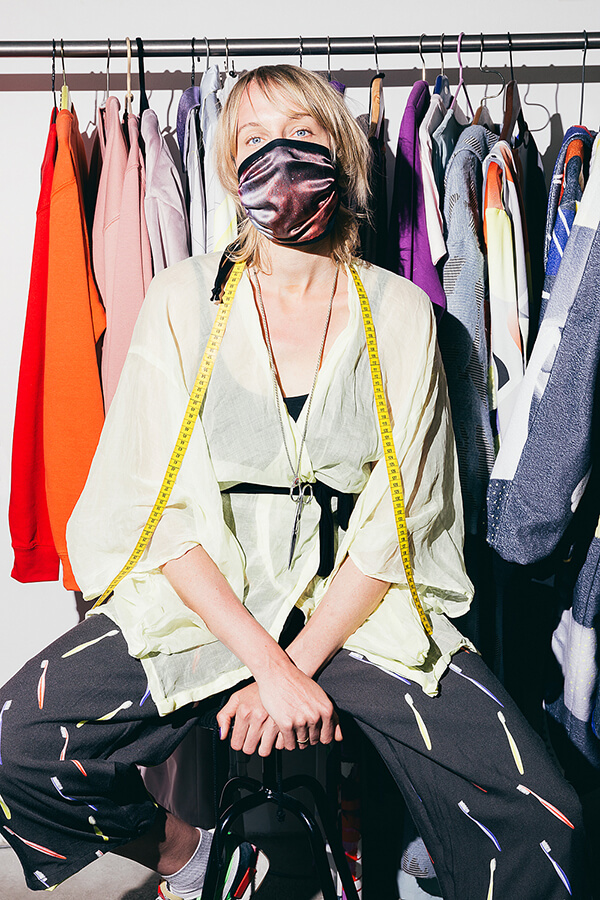
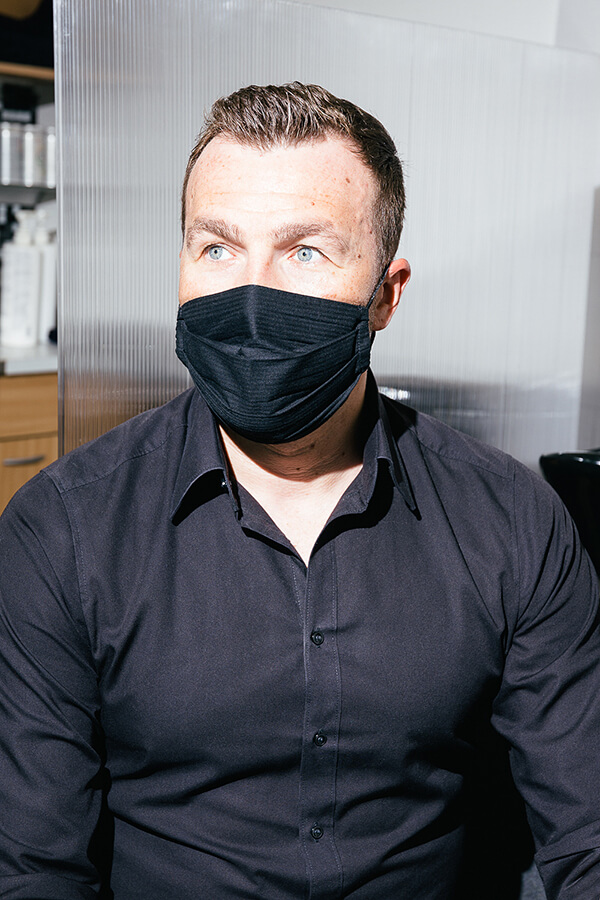
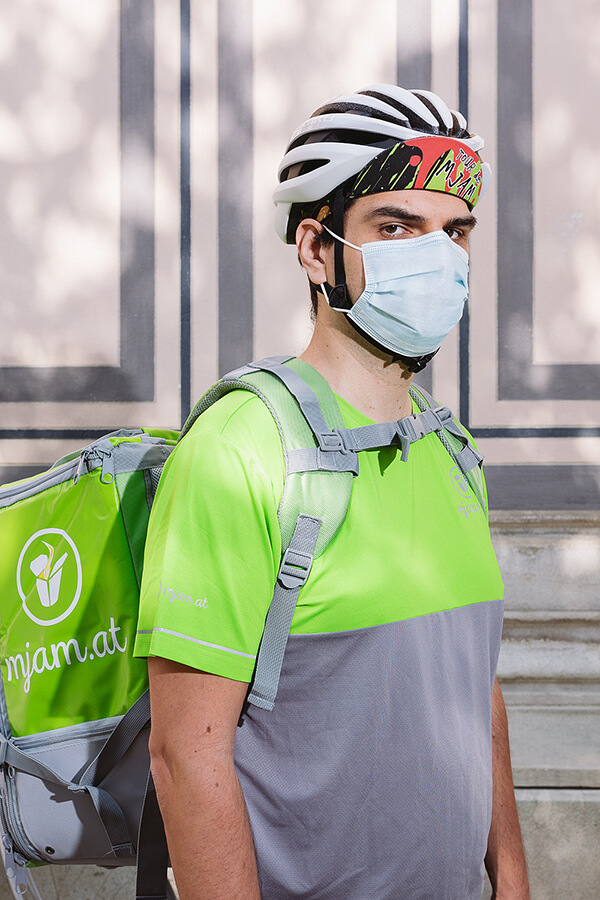
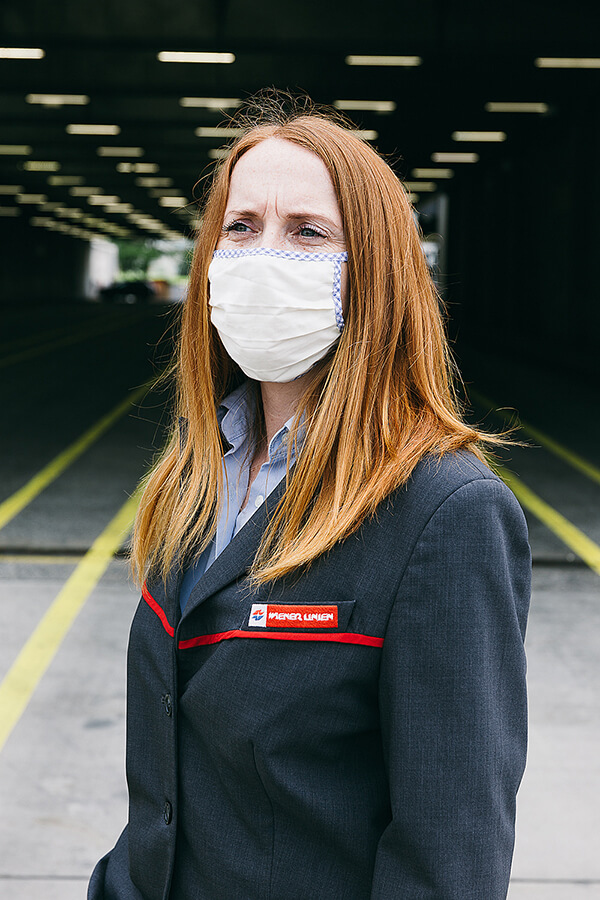
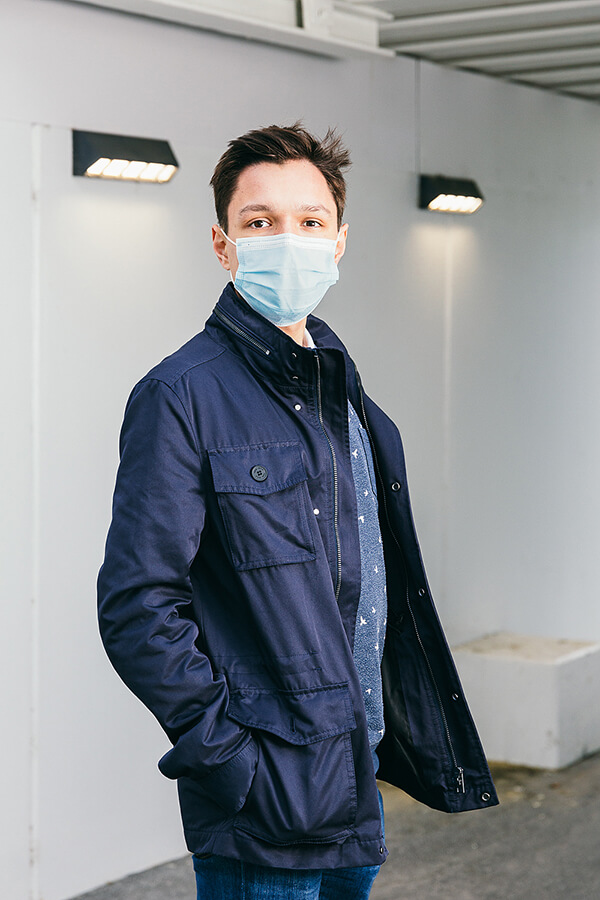
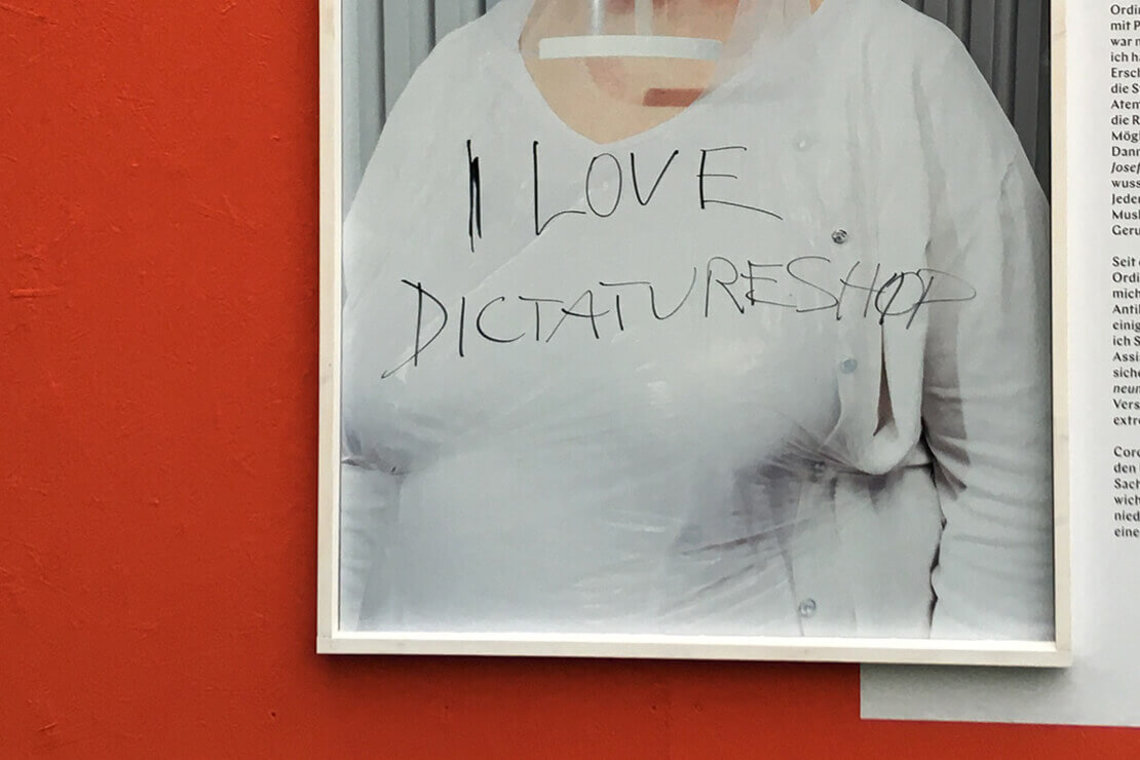
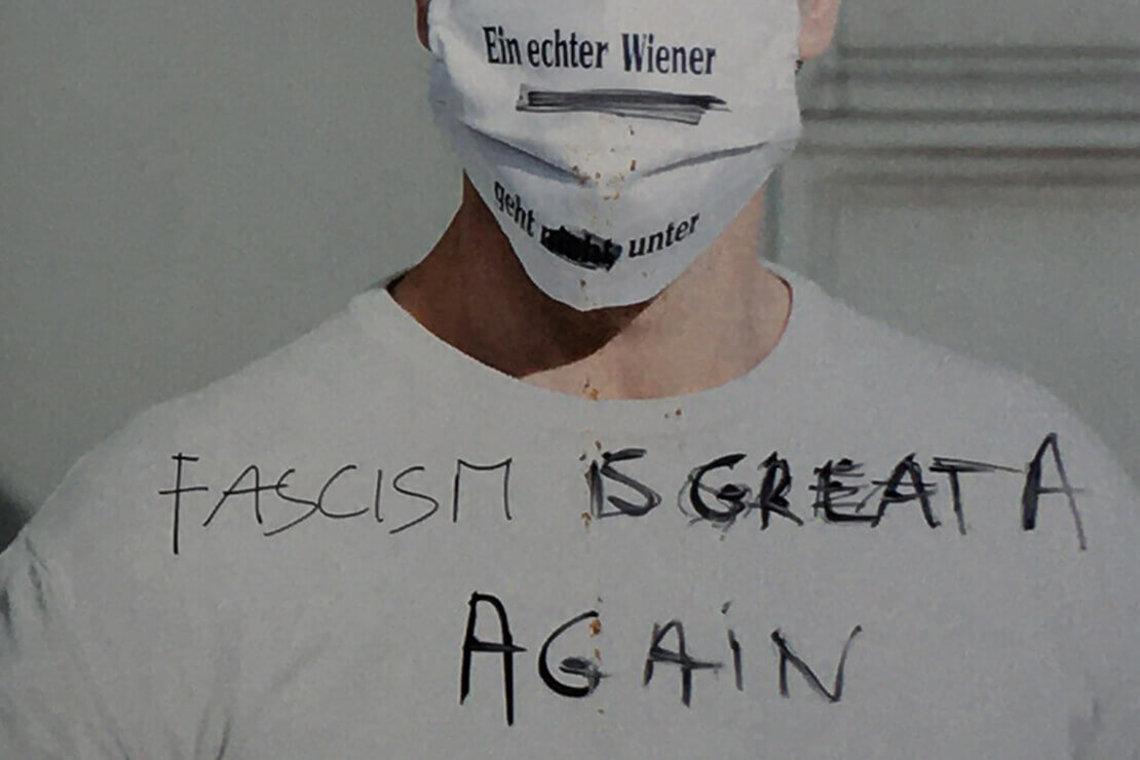
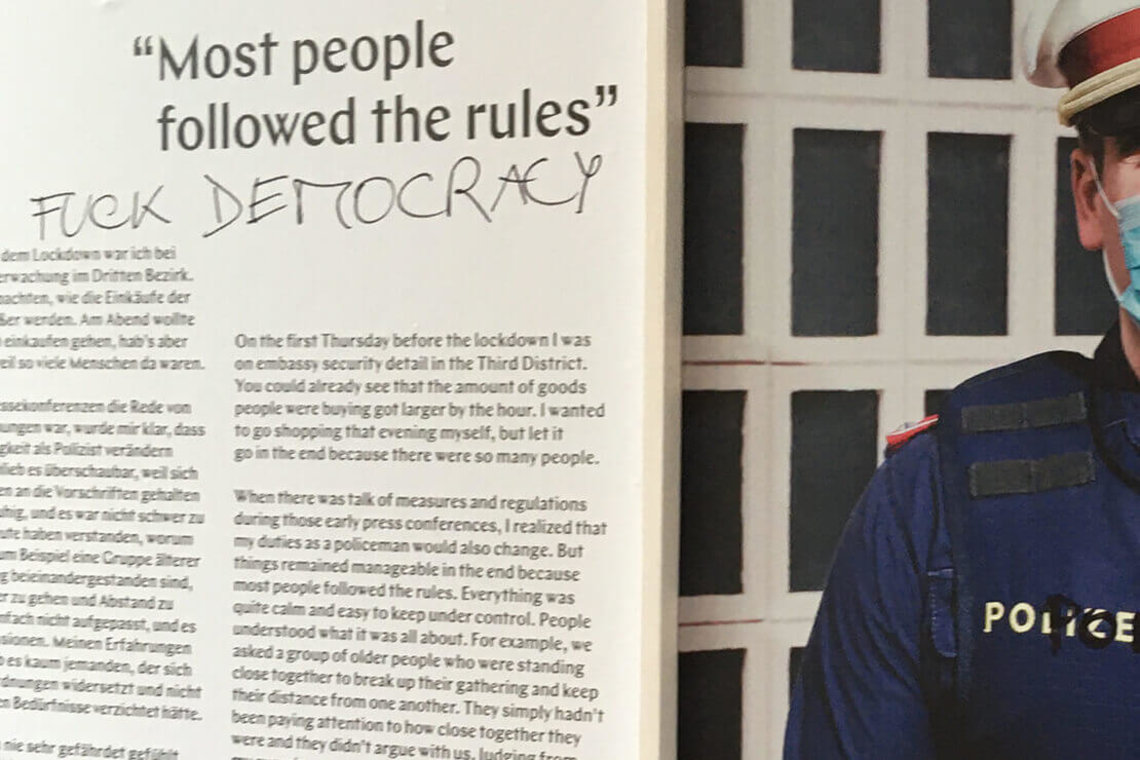
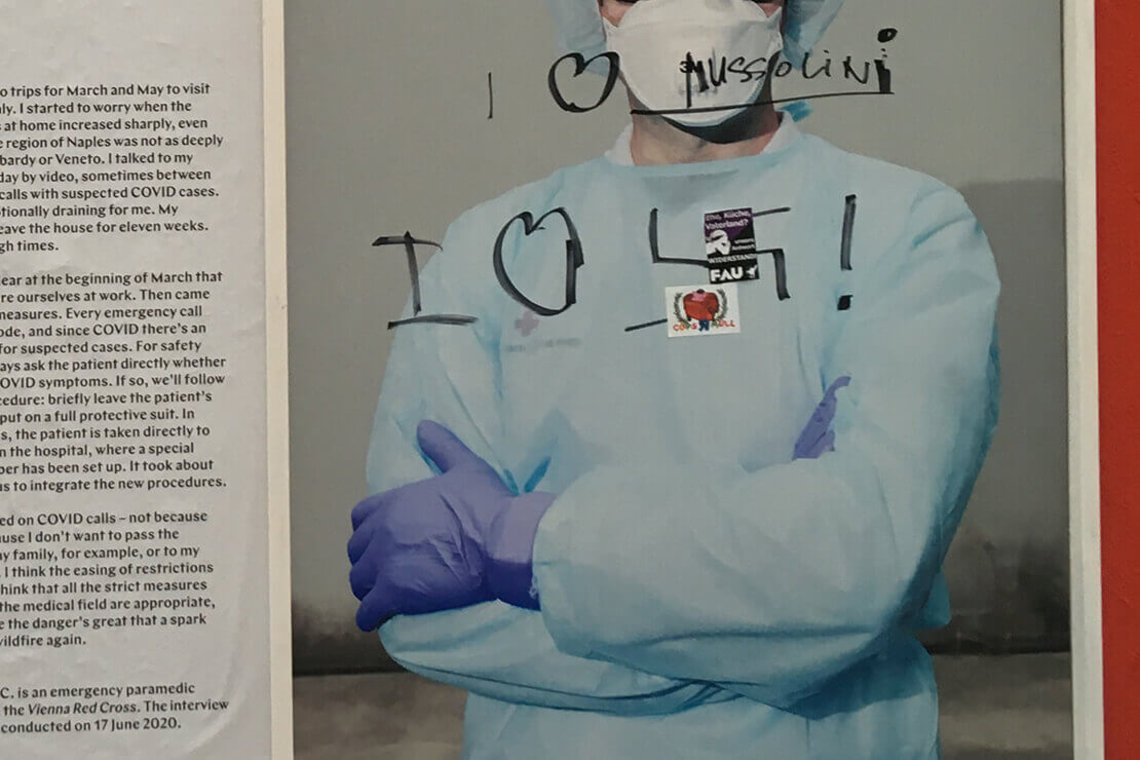
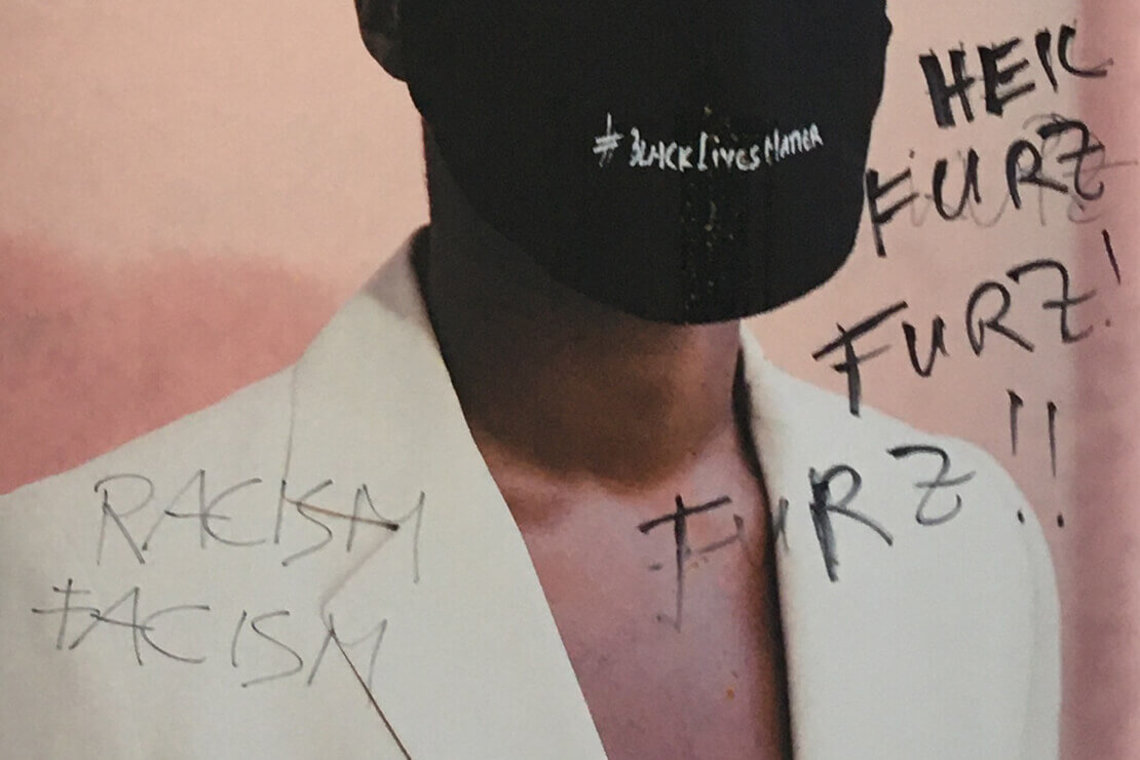
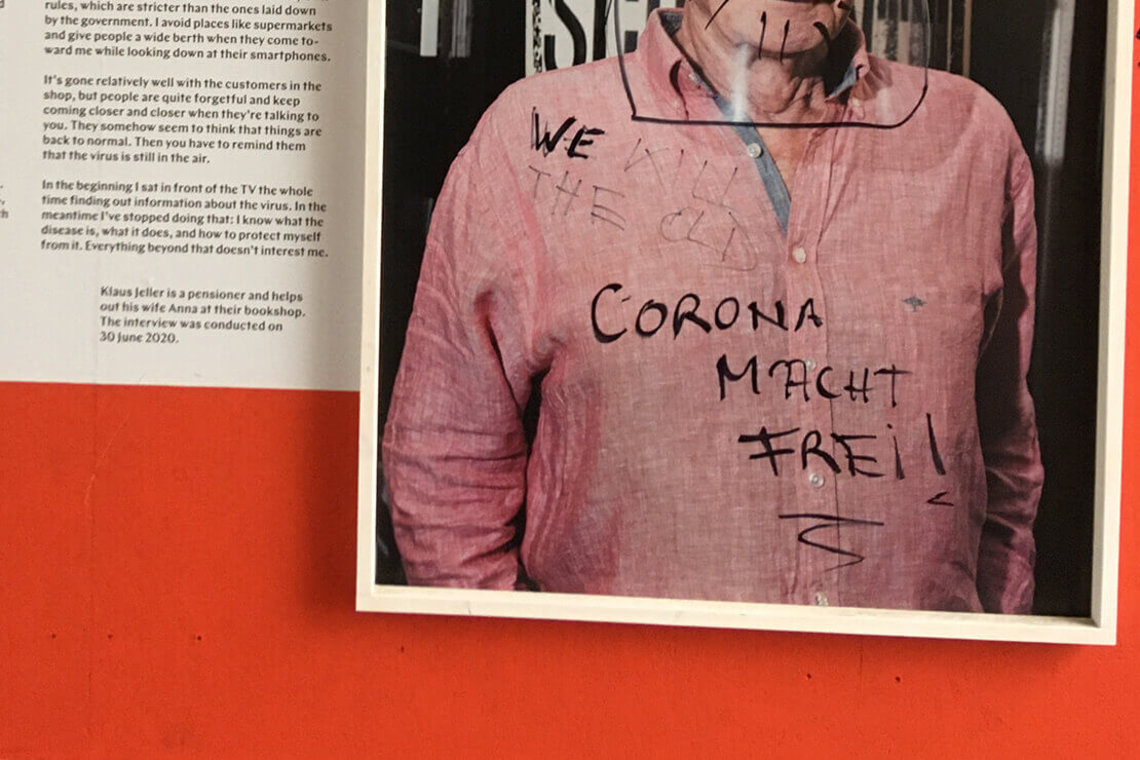
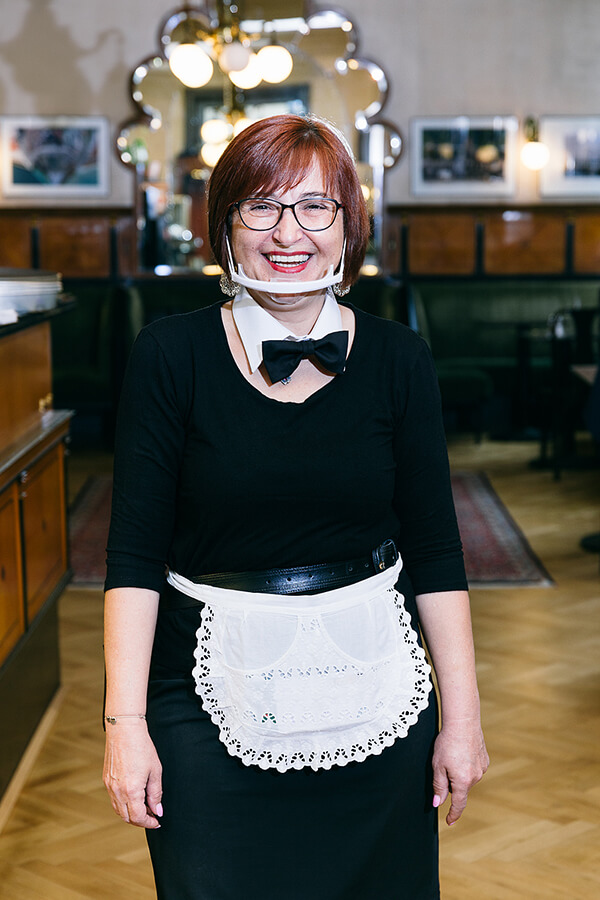
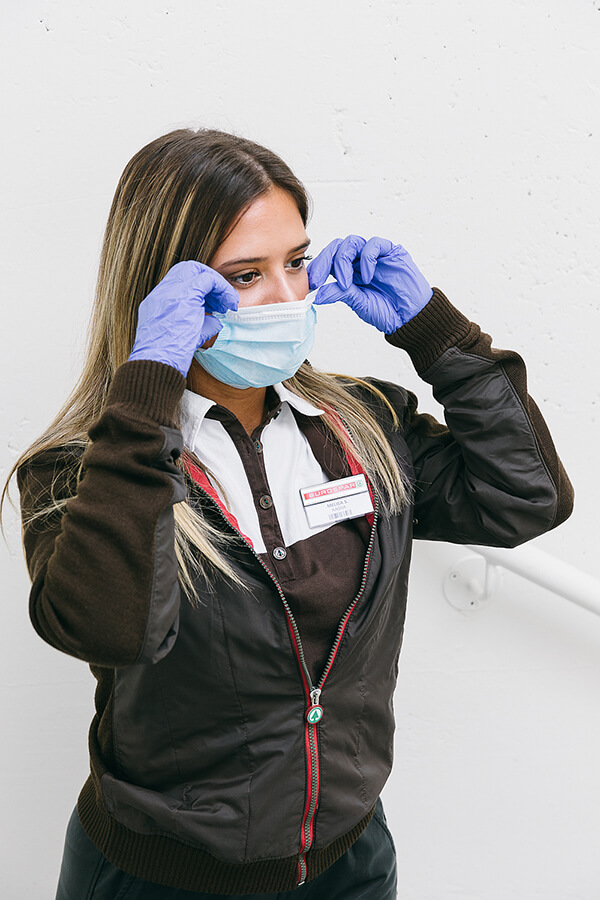
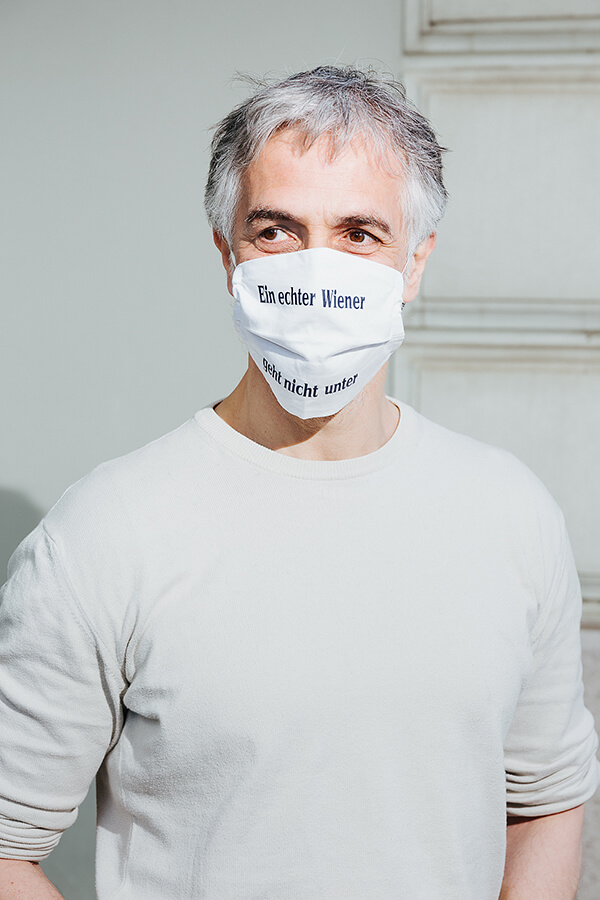
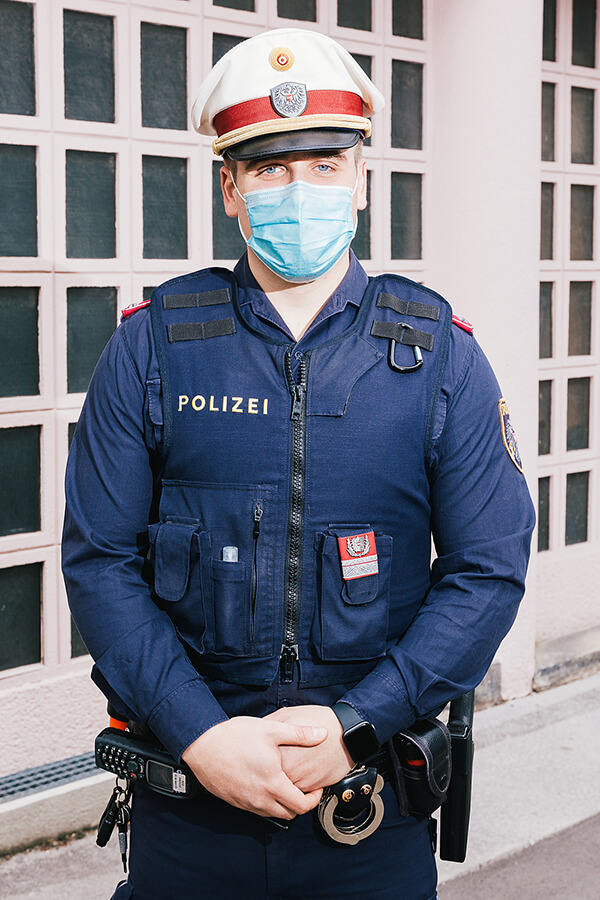
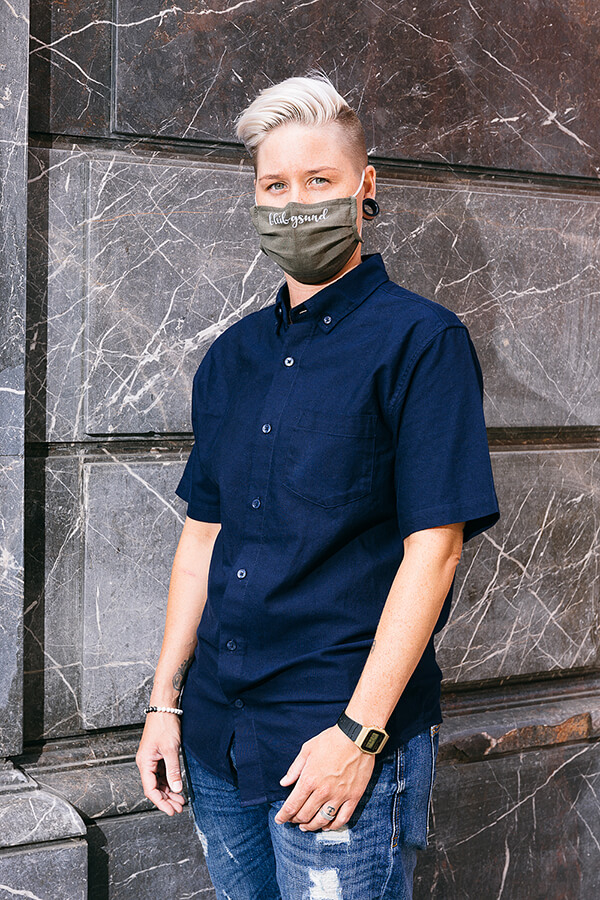
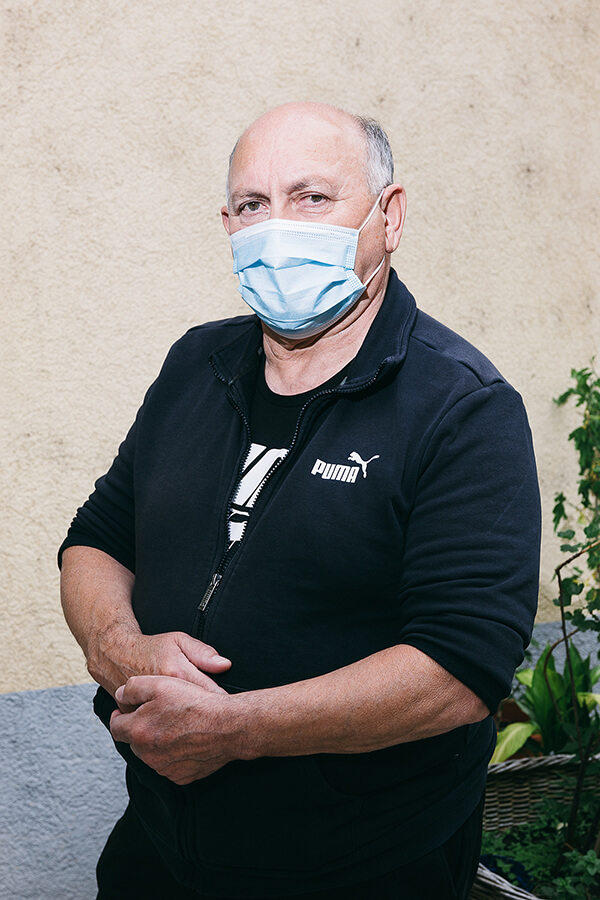
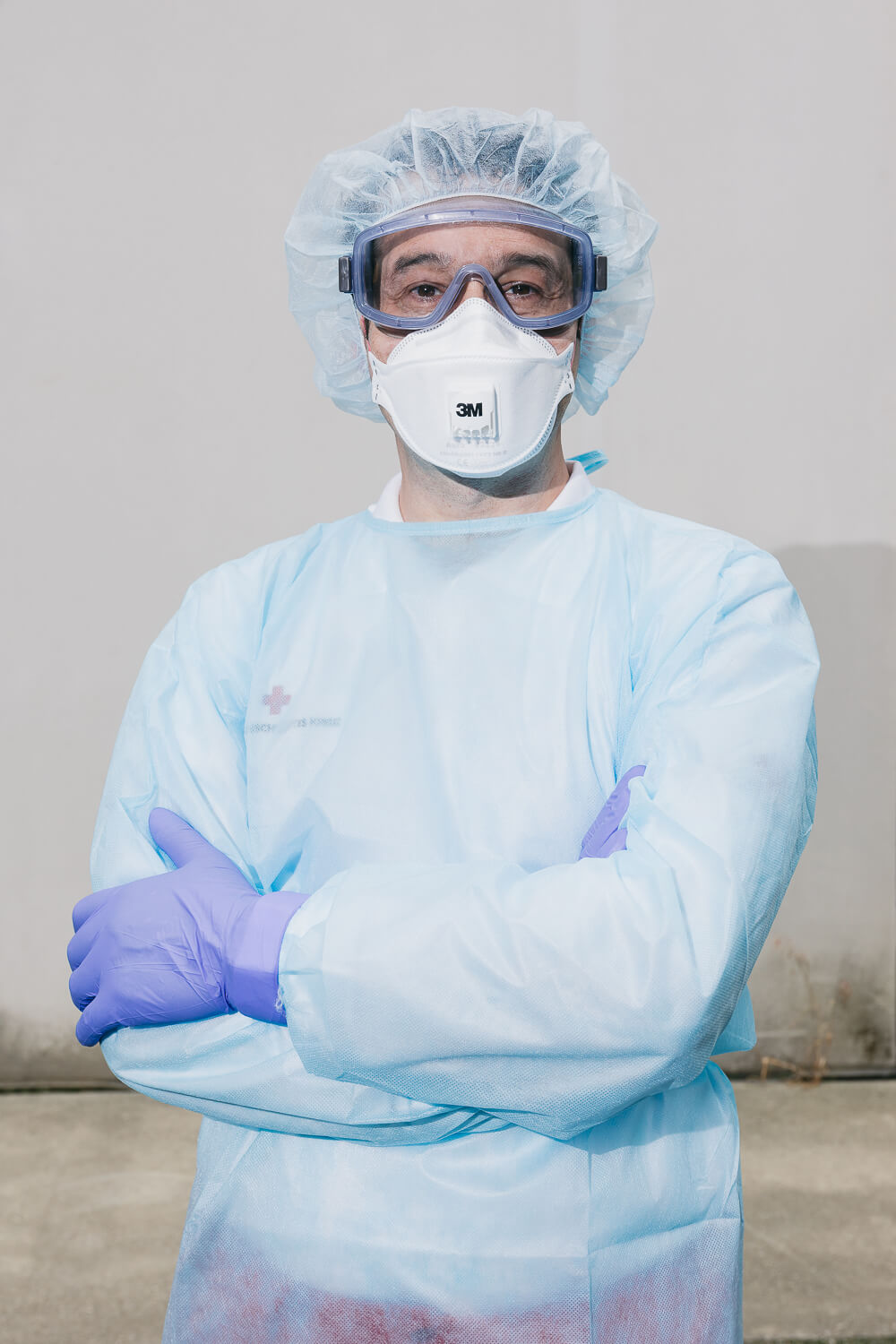
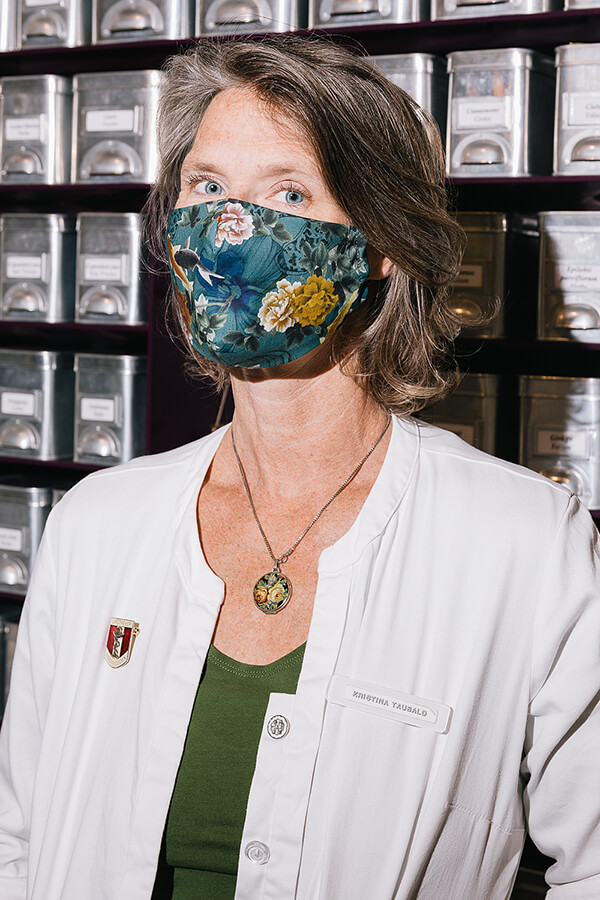
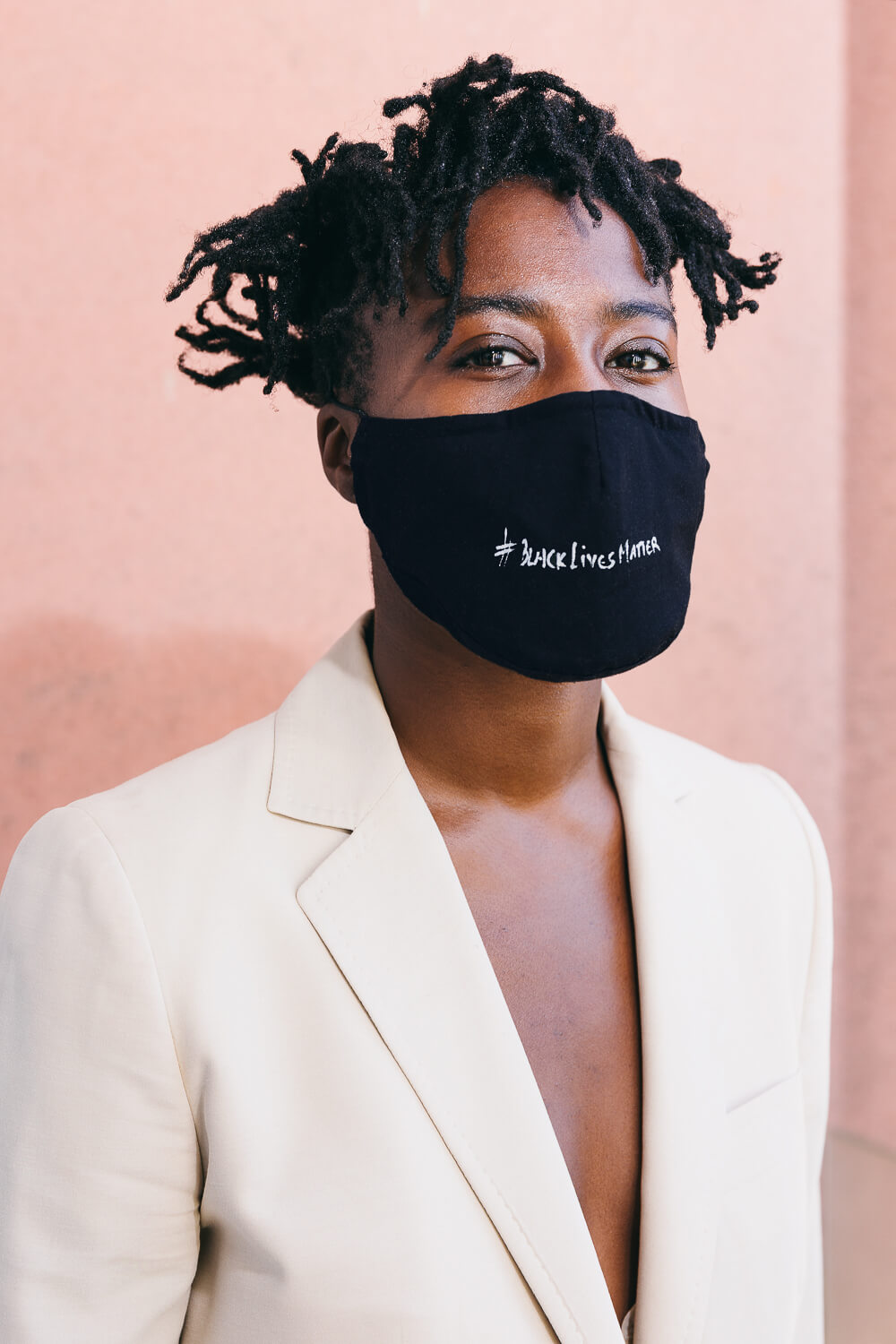
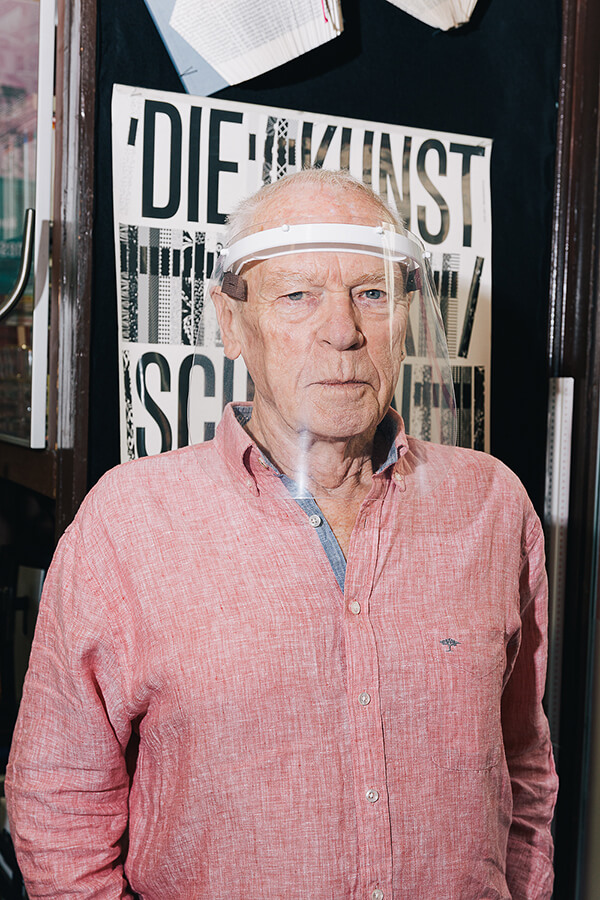
Kommentar schreiben
Kommentare
Keine Kommentare